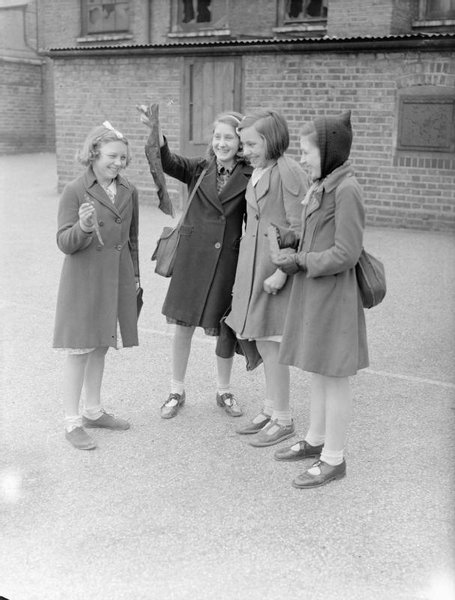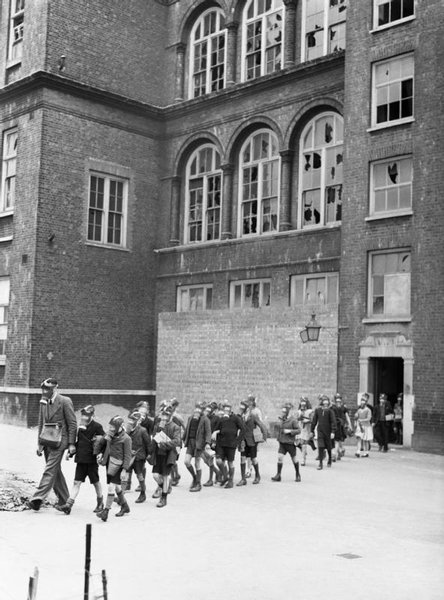Bombs dropped in the ward of: Peninsula
Description
Total number of bombs dropped from 7th October 1940 to 6th June 1941 in Peninsula:
- High Explosive Bomb
- 151
- Parachute Mine
- 6
Number of bombs dropped during the week of 7th October 1940 to 14th of October:
Number of bombs dropped during the first 24h of the Blitz:
Memories in Peninsula
Read people's stories relating to this area:
Contributed originally by nationalservice (BBC WW2 People's War)
This story was added to the site by Justine Warwick on behalf of Alan Tizzard. The author is fully aware of the terms and conditions of the site and has granted his permission ofr it to be included.
This is the story of how wartime stole my childhood and forced me to become a man
Saturday the 7th September1940 was a glorious summer day. I was 10-years-old, sitting in the garden of my parents home in Hither Green Lane just off Brownhill Road, caught up in the knock-on effect of the teacher shortage at Catford Central School in Brownhill Road and attended mornings one week and afternoons the next.
This was the case for those of us whose parents would not be parted from their children, or whose wisdom suggested something was fundamentally wrong with evacuation to destinations in Kent or Sussex. Surely these places were nearer the enemy across the Channel?
Anyway, I was at home with my mum, dad and older brothers and sisters and it was great!
My dad, because, he was a Lighterman and Waterman on the Thames and had been a policeman, found himself on the fireboats patrolling the river to
put out fires caused by enemy planes. My brother-in-law Jim was in the Auxiliary Fire Service (AFS) stationed in a nearby school. He drove a commandeered London taxicab that towed a fire pump trailer. Brother Ted was a peacetime Royal Marine, serving on HMS Birmingham. Brother Chris, at 16 years was crazy on American gangster films and used to make wooden models of tommy guns they used. He encouraged me to make model aircraft from the Frog Model kits of those days.
On that sunny Saturday afternoon in early September I was sitting on the kitchen step whittling away at my model when the sirens sounded. No sooner had the sirens stopped than the fírst planes came into sight. They were high, by the standards of the day, maybe twenty thousand feet. Hurricanes and ME109's. They were twisting and turning, weaving and bobbing. To me this was a grand show. So far my sight of war had been at a distance and knocked the cinema version into a cocked hat.
Suddenly what had been a spectator sport, not wholly real changed to War. I was to leave childhood behind forever.
From the front of the house we did not see the approach of that part of Luftflotte Zwei from across the Channel as they came from behind us. A sudden shower of spent machine cartridge cases rained down all around us. What had been the relatively dull ever-changing drone of the fighters in dog-fights high above our heads with their guns making no more than a phut, phut changed to pandemonium. The stakes had changed. We were now a part of it.
Chris said: "I think they're trying for the bridge." As he spoke, a Heinkel 111 flashed into sight coming in at an angle from our right. I believe it was being chased by a fighter as another shower of empty cases came down, bouncing and pinging on the front garden paths and pavements. Suddenly an aerial torpedo fell away from the Heinkel, which seemed to bounce higher into the air as the weight of the missile fell clear. The Heinkel disappeared, climbing away to its right out of our sight. Some seconds later we heard the explosion.
Two.
Later, in a conversation, my brother-in-law t the AFS man stated the showrooms had copped it from an aerial torpedo. From his comments and the first hand observation of my brother and myself that afternoon, I believe the Heinkel 111 we saw was the culprit.
I am not sure. But this much I know that was the day I stopped being a little
boy. I think it was seeing German planes still managing to fly in formation not withstanding all that the Hurricanes were doing to try to stop them, that took away my innocence.
Two days later, on the afternoon of Monday September 9,I answered a knock at the front door of my parents' home and was taken aback by the spectacle of a man so covered in oil and filth from head to foot that I didn't at first recognise my brother-in-law. Jim the firefighter had gone on his shift on the afternoon of 7th and had only then returned. Calming my alarm at his state, Jim explained that his unit had been in I he docks fighting fires
for over 72 hours and that at one point had been blown into the oil-covered waters.
The filth laden atmosphere pervaded the air for days. The sky to a great height wreathed with smoke of all colours that glowed red, orange and in some places blue.
Soot seemed to fall contínually and as you wiped it away it smeared your hanky and smelt of oil.
On the afternoon of the 11th September the sirens went again. We were all getting very weary from the raids, Í was little more than a young child and I had, had enough. I can't imagine what it must have been like for the grown up members of my family. ^^^H
Certainly, we had by now we had given up trying to brave it out when the bombing got local. So my mother, two sisters, my brothers Chris and Arthur and Jim, all climbed into the Anderson shelter in the garden.
Usually the doors were pretty firm. But things were really getting hot outside. All hell was going on out there
The door was hammering against the shelter and coming loose - at one point Jim leapt forward and simply held on while I was pushed to the floor and my sister Maisie threw herself on top of me As I lay pinned down I could see Jim rocking to and fro at each blast from outside.
I don't know when, but in due course things became quieter, and Jim climbed out. I don't recall actually leaving the Anderson, but I do
remember what 1 found outside. My mother's orderly wartime garden, her pride and joy, was a wreck. The back door to the house 'was laying in the yard. All the rear windows were gone, where the frames had survived shreds of what had been net curtains hung in tatters.
The whole house was in tatters. The road outside was a shambles, everywhere were those empty cartridge cases. Arthur and I started collecting them looking to see if they were theirs, or ours. Over on the other side of the road, a showroom was burning, soldiers were milling around some kind of control vehicle with a dome on top painted in a chequer-pattern. I believe they must have been bomb disposal chaps.
Three.
I remember later, in the back garden my brother Arthur endeavours to chop with a garden spade the burnt half of an otherwise un-burnt incendiary bomb that he had found in the front garden.
The whole thing had an unreal feeling about it. It was then that my family moved.
I have no recollection of any decision being taken by my elders to leave the house. I do recall being in the back of what must have been a 15-cwt Army lorry with some but not all of my family. The vehicle bumped away from our house and as I looked through the back I was being cuddled by my older sister Maisie. The sky was yellowy and smoky. Opposite and to the left of our house five houses had five houses had their upper floors torn away, our lovely Methodist Church and my cub scouts' hall had totally disappeared.
The 15-cwt turned left into Wellmeadow Road and made its way to the rest-centre at Torridon Road School where we remained until the 15th September before temporary evacuation to Sutton-in-Ashfield Notts. We returned to Bomb the Alley of southeast England after a short respite and I regarded myself as grown-up for the remainder of the war.
NB:This article written by me appeared in The Greenwich Mercury November 28th1996.
The article was accompanied by two photographs one of me in my parents wartime garden of the house from which we were bombed out shortly after it was taken.
The other photograph was taken in 1954 following my return to England having been in the Occupation Army in Germany.
The little girl in one of the pictures was Joyce Eva Maycock of Hampton Village, Evesham, Worcestershire a sweet little thing from the country not realising she would later marry the urchin above. (as I write this Tuesday, August 03, 2004 come tomorrow Wednesday 4th August 2004 we shall have been married fifty years)













